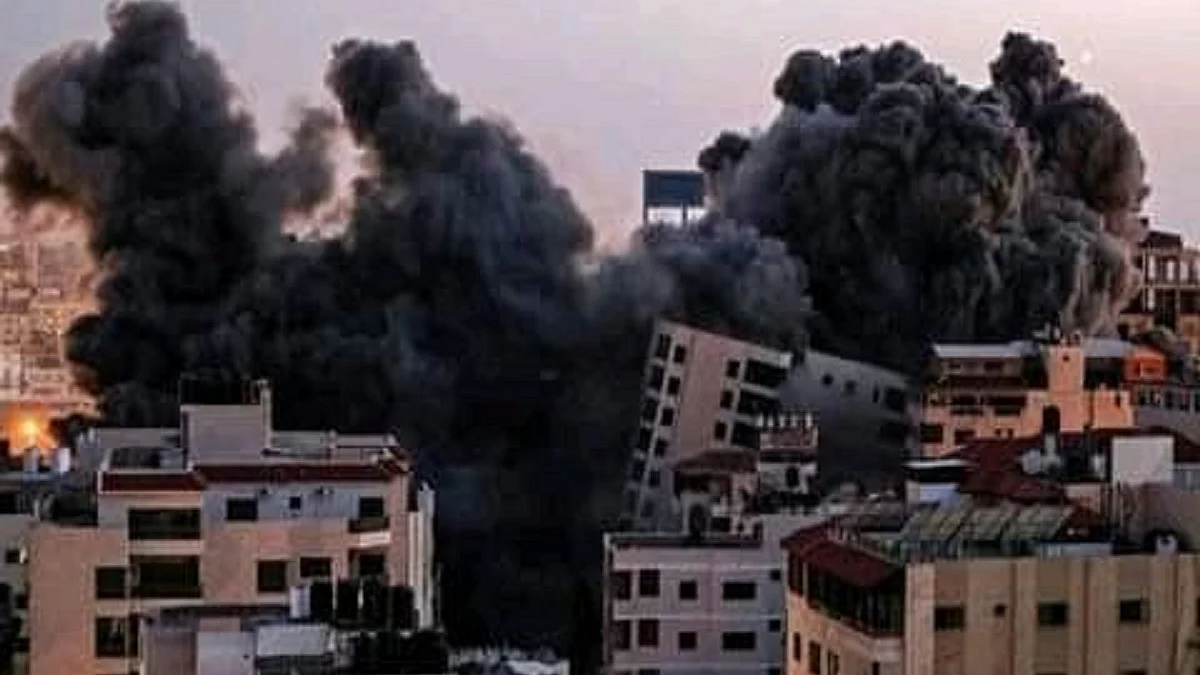Escalating Mideast violence bears hallmarks of 2014 Gaza war
The Jerusalem turmoil and the ensuing battle come at a time when the long-stalled Israeli-Palestinian peace process is virtually non-existent

Rockets streamed out of Gaza and Israel pounded the territory with airstrikes on Wednesday as the most severe outbreak of violence since a 2014 war took on many hallmarks of that devastating 50-day conflict, with dozens killed and no resolution in sight.
Palls of gray smoke rose in Gaza, as Israeli airstrikes levelled two apartment towers and hammered the militant group's multiple security installations, destroying the central police compound.
In Israel, barrages of hundreds of rockets fired by Gaza's Hamas rulers and other militants at times overwhelmed missile defenses and brought air raid sirens and explosions echoing across Tel Aviv, Israel's biggest metropolitan area, and other cities.
The death toll in Gaza rose to 48 Palestinians, including 14 children and three women, according to the Health Ministry. More than 300 people have been wounded, including 86 children and 39 women.
Six Israelis, including a soldier, three women and a child, were killed, and dozens of people were wounded.
While the rapidly escalating conflict has brought images familiar from 2014 Israel-Hamas war, the past day has also seen a startling new factor: A burst of fury from Israel's Palestinian citizens in support of those living in the territories and against Israel's recent response to unrest in Jerusalem and its current operations in Gaza.
Amid those protests, communal violence erupted in several mixed Jewish-Arab Israeli cities, including the burning of a Jewish-owned restaurant and a synagogue, the fatal shooting of an Arab man and attacks on Arab-owned cars.
In a rare move that highlighted the tensions, Israeli Defense Minister Benny Gantz on Wednesday ordered units of border guards deployed to help police keep order.
There was no sign that either side is willing to back down. Prime Minister Benjamin Netanyahu has vowed to expand the offensive, saying this will take time. Hamas has called for a full-scale intifada, or uprising. The last such uprising began in 2000 and lasted more than five years.
The latest eruption of violence began a month ago in Jerusalem, where heavy-handed police tactics during the Muslim holy month of Ramadan and the threatened eviction of dozens of Palestinian families by Jewish settlers ignited protests and clashes with police.
A focal point was the Al-Aqsa Mosque compound, a site sacred to Jews and Muslims.
Late Monday, Hamas, claiming to be defending Jerusalem, launched a barrage of rockets at the city in a major escalation.
The Israeli military said militants have fired more 1,050 rockets since the conflict began, with 200 of them falling short and landing inside Gaza. Lt. Col. Jonathan Conricus, a military spokesman, said two infantry brigades were sent to the area, indicating preparations for a possible ground invasion.
The army also confirmed that a soldier Staff Sgt. Omer Tabib, 21 was killed in an anti-tank missile attack near the Gaza Strip, the first Israeli military death in the fighting.
Israel has struck hundreds of targets in the Gaza Strip, where 2 million Palestinians have lived under a crippling Israeli-Egyptian blockade since Hamas took power in 2007.
The fiercest attack was a set of airstrikes that brought down an entire 12-story building. The building housed important Hamas offices, as well as some businesses. Israel fired a series of warning shots before demolishing the building, allowing people to flee and there were no casualties.
Israeli aircraft heavily damaged another Gaza City building early Wednesday. Israel said the nine-story building housed Hamas intelligence offices and the group's command responsible for planning attacks in the occupied West Bank; it also had residential apartments, medical companies and a dental clinic. A drone fired five warning rockets before the bombing.
Fighter jets struck the building again after journalists and rescuers had gathered around. There was no immediate word on casualties. The high-rise stood 200 meters (650 feet) away from the AP bureau in Gaza City, and smoke and debris reached the office.
In another strike, Hamas' Gaza City commander was killed Wednesday, the group confirmed, making him the highest-ranking military figure in the group to be killed by Israel since the 2014 war. Israel's internal security agency said that a series of airstrikes had killed Bassem Issa and several other senior militants.
At one point on Wednesday, Hamas fired 100 rockets at the Israeli desert town of Beersheba in what it said was retaliation for some of the strikes.
Samah Haboub, a mother of four in Gaza, said she was thrown across her bedroom in a moment of horror by an airstrike on an apartment tower next door. She and her children, aged 3 to 14, ran down the stairway of their apartment block along with other residents, many of them screaming and crying.
There is almost no safe place in Gaza, she said.
One strike hit a taxi in Gaza City, killing a man, woman and driver insider, and a second strike killed two men nearby on the street, witnesses who brought the bodies told the AP at the hospital. Several other bystanders, including a woman, were wounded.
In the Israeli city of Lod, a 52-year-old man and his 16-year-old daughter, reportedly Arab citizens of Israel, were killed early Wednesday when a rocket from Gaza hit the courtyard of their home.
The Jerusalem turmoil and the ensuing battle come at a time when the long-stalled Israeli-Palestinian peace process is virtually non-existent.
Follow us on: Facebook, Twitter, Google News, Instagram
Join our official telegram channel (@nationalherald) and stay updated with the latest headlines